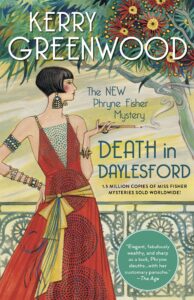Many of my fans seem surprised to learn that before I was a published author I was a solicitor for the Legal Aid Commission. For the benefit of my not-quite-so-learned friends, perhaps I should explain that it is nothing like anything you see on TV or in films. I see lawyers onscreen and they only seem to have one, or at most two, cases. And we all ask ourselves the obvious question. What on earth do these people DO all day?
Perhaps you may have seen a chess master giving a simultaneous display. There is an entire room filled with people sitting at chess-boards. In the middle, the master walks around from board to board; their opponent makes a move; the master stares at the board for a moment and makes their reply. That is what being a public defender is really like. On an average day in court I’d run around eighteen cases (my record was twenty-six) and advise many other clients.
I am occasionally asked if I ever wanted to turn any of my cases into fiction. One of the main reasons I write what some people call escapist fiction is that I know only too well how horrible real life can be. I don’t think people should want to wallow in second-hand grime. And in any case their stories were not really mine to tell. I vowed that I would never write a character from my legal aid practice who was clearly identifiable. Being working-class myself, I know only too well that the poor have only their pride, and this must not be needlessly humbled. In Australia, Cabinet documents are classified for thirty years. For my legal practice I thought twenty years was enough.
My practice was far more colorful than most. Rumpole never prosecutes, and neither did Greenwood. I worked for the Legal Aid Commission and gave free advice and legal representation to anyone who needed it. Because appearing in court seemed to me the most important thing I could do with my life, I volunteered. I didn’t want to sit in a cosy office anyway. I wanted to be doing Rumpole things, and be an advocate for those who had no voice of their own. At the height of my career I was appearing in three different courts every week. ‘Anyone for Legal Aid?’ I would ask. Oh yes. Word got around about me. As my writing career blossomed I reduced my hours. By the end I was paid for five hours a week (around $A130), and for this trifling sum I would represent my twenty-odd clients in court and out of it; and stagger home knowing that whatever I was doing this for, it certainly wasn’t for the money.
One of the main reasons I write what some people call escapist fiction is that I know only too well how horrible real life can be. I don’t think people should want to wallow in second-hand grime.
Jason—the junkie turned baker from the Corinna books—was indeed one of my cases. The owner of a famous patisserie in St Kilda (a locale infamous for drugs) found his real-life equivalent flaked out on the pavement outside her shop. Being Jewish, she saw an opportunity for a mitzvah and offered him food if he would wash dishes. Little by little the boy dried out and began to put on weight and condition. She kept on offering him work, and he became her apprentice.
One morning I was on duty as usual, and heard his name called for yet another burglary. I had represented him before and did not expect he would live much longer. When his name was called, I didn’t recognize him. Neither did the magistrate, who listened as I explained my client’s unexpected salvation. Mrs S then confirmed his story. His Worship was not entirely convinced, and asked him to expound the making of cakes. In particular the cake he had brought into court, which would be given to me if I managed to get him off. This was a sensible judicial decision; but after two minutes of Jason’s exposition the magistrate had heard enough, and adjourned the case for twelve months on a good behavior bond. The cake was amazingly good; and so far as I know he never relapsed. I waited years before turning this amazing true story into fiction. Long enough for Jason’s real-life equivalent to have lived down his teenage lapse from grace, and that the chance that anyone reading my books might recognize him had long evaporated. His back story was even more horrible than my fictional Jason’s, but I toned it down somewhat.
Most of my clients weren’t in the least evil. They were feckless, disorganized, lacking in self-control and stupid beyond belief. The only client I ever represented who sent a chill down my spine was up on a relatively minor charge. His pregnant girlfriend was sitting in court. I realized that her only chance of having any sort of decent life was to have her comprehensively wicked boyfriend locked up. The magistrate concurred, and gave him the maximum sentence possible of two years. He was generally a lenient and merciful magistrate. Most of them are. His eyes flicked over mine in silent enquiry.
Please understand that I still represented him to the best of my ability. I can do no other. As an officer of the court I am obliged to represent everyone as best I can, and I did so. Do I intend to appeal? he seemed to be asking. Back in those days, the form you had to fill in to appeal a decision was bright yellow. Sometimes during a magisterial harangue to my client I would allow the Bench to observe me ostentatiously filling in my yellow form. Just letting him (back then it was always a him) know that I intended to take this to the County Court. His Worship’s eyes noted the entire absence of yellow on the Bar table, and nodded. While I fulfilled my duty to the accused, the girlfriend was also my client. My duty of care to her was duly carried out. I still don’t know how the accused’s miasma of absolute evil had communicated itself to His Worship. But he was a very intelligent and sagacious judge indeed.
For the rest, my clients were mostly comically stupid. The young man who tried to jemmy open a door using his Medicare card, which broke off, leaving the half with his name on it trapped in the lock. The youth who stole a car and left his bail notice in the back seat. The bank robber who was so tremendously incompetent that the teller laughed at him. As he ran away he managed to get himself trapped in the revolving door. I easily persuaded the court that he was no threat whatever to anybody but himself. The gruff magistrate gave him a suspended sentence and said ‘Give it up, son. You have no talent for crime.’
The very first case I took on was an old lady who had passed out in front of the local supermarket. When concerned bystanders rushed to assist, they found out she had become unconscious from hypothermia because of the stolen frozen chicken under her woolly hat. She was then arrested and charged, which I thought was a bit thick. I spoke to the woman. Why had she nicked the poultry? Because she wanted to welcome her son home from jail. He’d just got out.
My advantage was that I knew plenty of people who had gone to jail. Most of my Dad’s friends for a start. I knew that they expected a certain amount of celebration when they emerged. In the days before fast food, that meant roast chicken with gravy and vegetables, and pudding for dessert. Chicken was expensive. My family only had chicken for birthdays and Christmas. So although she had priors for shop theft, I thought I would test the Magistracy for humor. After all, it was my first appearance, I could ask him to be gentle. I made a plea that threw in ‘fowl deed’ and ‘paltry offence’ and so on, until the police prosecutor giggled. At which point the magistrate, who had not cracked even a simper, dismissed us and threw us out of court without a penalty. And we went. The old lady did ask for her chicken back, which was politely refused. And her son did the tough man’s equivalent of a manly hug for a female who has done him some service. He kissed his fist and swung it gently to touch my jaw. I appreciated it for what it was. I subsequently heard a young solicitor from a Nice School complain that this was an assault. As I said, the advantages of a working class childhood.
And there were the strange cases involving animals. Toby the shoplifting dog was indeed a highlight. But for all these cases you will have to wait a little longer. My legal memoirs are still under construction. But I promise that you will be entertained by them, as well as occasionally scarified. But as in my detective stories, light will prevail over darkness.
***


















